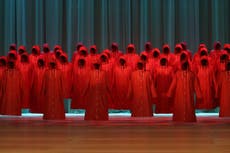Samson et Dalila review, Royal Opera House London: Meticulously choreographed production has many bewitching moments
Richard Jones’s version must stand in a line of Samsons and Delilahs as portrayed by artists including Rubens, Van Dyck, and Dore, and with gusto by Hollywood

Some operas readily lend themselves to topical treatment, but Camille Saint-Saëns’s Samson et Dalila (Samson and Delilah) requires very careful handling – as the editorial spiel in the programme nervously hints. Richard Jones’s production will “eschew both traditional Orientalism and contemporary conflict”, so, no cosy exoticism, and no whiff, please, of Jew-versus-Arab strife.
Must this Hebrew Samson and his fateful Philistine paramour be kept in a box marked “Myth”, with their motivations interpreted in timelessly psychological terms? Why not? As a professor of biblical studies aptly points out in a curtain-raiser essay, the lesson this story teaches about the perils of love “reveals less about women than about the men who created it, and their anxieties about women”.
Jones’s version must stand in a line of Samsons and Delilahs as portrayed by artists including Rubens, Van Dyck, and Dore, and with gusto by Hollywood. Saint-Saëns’s work has got into the general musical bloodstream thanks to two things: Dalila’s signature aria “Mon coeur s’ouvre a ta voix”, and the Philistines’ triumphal Bacchanale before they are squashed under the collapsing temple.
This opera may have dramatic longueurs, but its score radiates splendour and has many bewitching moments, so Jones has a licence to roam. And, with his designer Hyemi Shin, he has done so in a way that is so provocative, that the straw poll I conducted as we filed out on the first night showed people were sharply divided.
The opera begins with the Hebrews begging Jehovah to release them from their oppression by the Philistines, and here they trudge wearily on stage to be beaten up and robbed by uniformed soldiers: this could be an exact representation of what has been happening in Ukraine. It’s sickening to watch.
Samson – the South Korean tenor SeokJong Baek, every inch an agile fighter – emerges from their ranks to rouse them to war, and their singing morphs into what sounds like a Bach chorale. The stage then turns into an airport tunnel, in which the Hebrews assemble, get out the Torah, and begin to pray: the tunnel is now an impromptu synagogue. Shin’s designs are gracefully restrained, as is the bearing of the chorus.
The Latvian mezzo Elina Garanca – famed for her golden tone, and for the intuitive intelligence of her interpretations – is Dalila, and one couldn’t imagine a better. The backstory is a previous love affair between the protagonists, and when Baek’s Samson encounters Garanca’s regal Dalila and her seductive dance, his will to resist her visibly crumbles. Running her hands through his tumbling locks, she is a predator, and he is her willing victim.
We are intended by the libretto to believe that she is actuated by political vengeance, but the music – and Garanca’s singing – suggests that she’s got the hots for her old lover. Indeed, this is a vocal pairing made in heaven, with Baek’s warm, sweet tenor piteously complementing Garanca’s lethally perfect sound. Their duets may have a recital-style finesse, but they drip with lust. Samson’s blinding and shearing happens offstage.
But with the arrival of the Bacchanale – in which the Philistines drunkenly celebrate their victory – the world changes, with visual restraint turning to wild excess. Musically speaking the opera coarsens itself and becomes predictable, and Jones and Shin take their cue accordingly.
The chorus are now Philistines, and their meticulously choreographed antics have an old-fashioned Soviet tinge, while a gigantic effigy of a caricatured Mammon dominates the stage. Everything is tacky and vulgar, but done with such swagger that only purists could complain. Samson’s destruction of the temple is the excuse for a brilliant coup de theatre.
Musically, too, the evening is a triumph, with strong casting in the supporting roles, and thanks to Antonio Pappano’s direction in the pit as he draws out the pity and terror of the score, as well as its moments of beauty.
Join our commenting forum
Join thought-provoking conversations, follow other Independent readers and see their replies
Comments


Bookmark popover
Removed from bookmarks